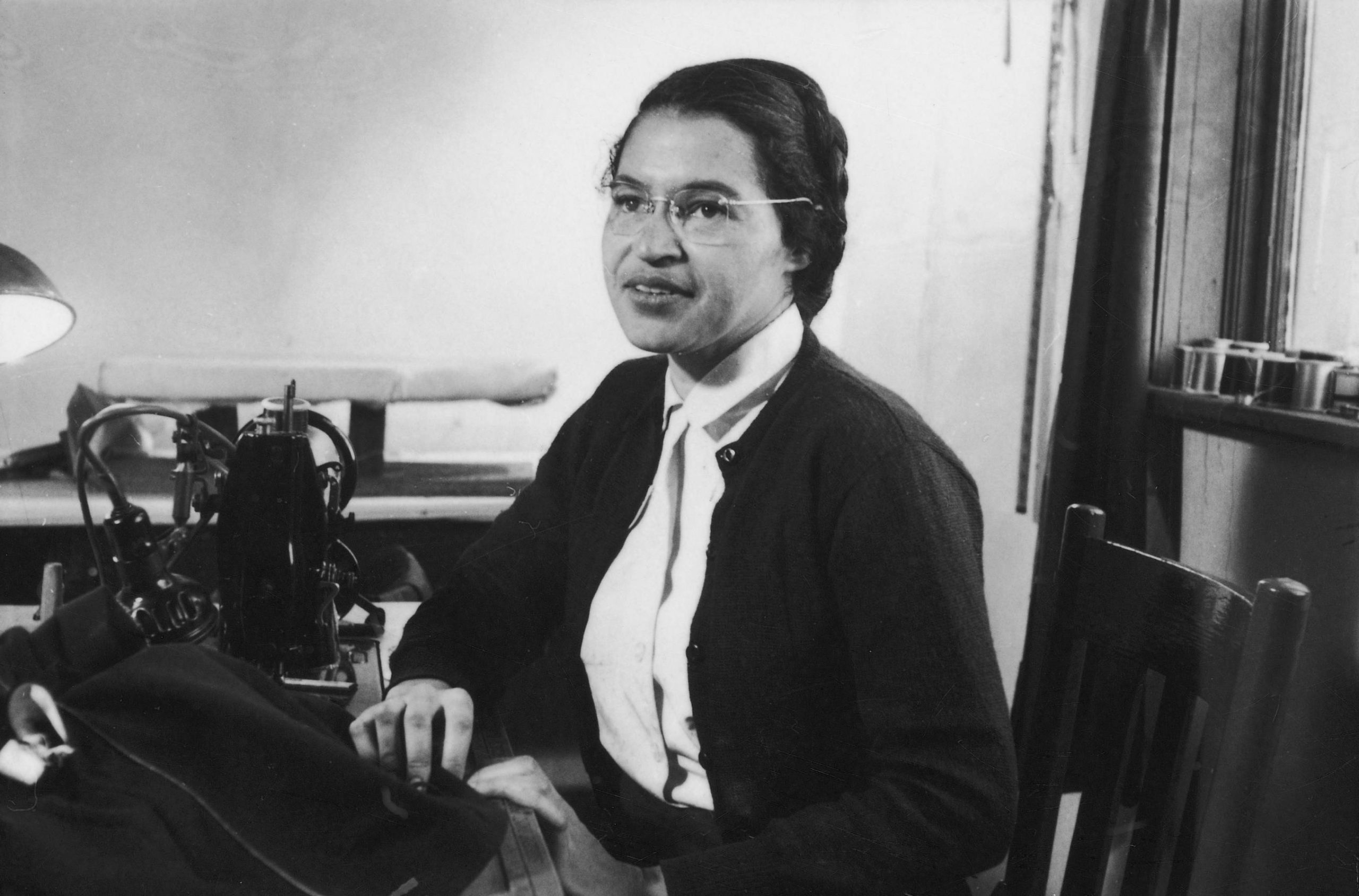10 Important Facts About Rosa Parks That Changed the Course of History

Rosa Parks is often hailed as the “mother of the civil rights movement” in America, and for good reason. Her courageous act of defiance on December 1, 1955, when she refused to give up her bus seat to a white passenger, became a pivotal moment in the fight against racial segregation.
This simple yet profound gesture not only challenged the oppressive norms of the time but also ignited the Montgomery Bus Boycott, a significant event that propelled the civil rights movement into the national spotlight.The civil rights movement was a critical period in American history, marked by widespread activism and efforts to end racial injustice and inequality.
Rosa Parks’ involvement went far beyond that fateful day on the bus; she was an active participant in the National Association for the Advancement of Colored People (NAACP) and continued to be a prominent figure in the struggle for racial equality throughout her life.
The purpose of this blog is to shed light on some of the key facts about Rosa Parks, revealing how her actions and dedication had a monumental impact on the course of history. By exploring her life and contributions, we can gain a deeper understanding of her role in the civil rights movement and the enduring legacy she has left behind.
Fact 1: Her Early Life and Education
Rosa Louise McCauley was born on February 4, 1913, in Tuskegee, Alabama, to James and Leona McCauley. Her father was a carpenter, and her mother was a teacher, instilling the value of education from a young age. After her parents separated, Rosa moved with her mother to Pine Level, Alabama, to live with her maternal grandparents.
Growing up in the deeply segregated South, Rosa experienced racial discrimination firsthand, which profoundly shaped her worldview. She attended a segregated, one-room school in Pine Level, where she learned to read with the help of her mother and grandparents.
Rosa later enrolled at the Montgomery Industrial School for Girls, a private institution that emphasized both academic and vocational skills and was run by northern white women. This school, committed to the principles of equality and self-worth, had a lasting influence on Rosa, reinforcing the importance of education and the need to stand up against racial injustice.
Fact 2: The Montgomery Bus Incident
On December 1, 1955, Rosa Parks boarded a Montgomery city bus after a long day of work at the Montgomery Fair department store where she was employed as a seamstress. She took a seat in the “colored” section of the bus, as mandated by the city’s segregated bus policy.
As the bus became crowded, the driver instructed Rosa and three other African American passengers to vacate their seats for white passengers. While the other passengers reluctantly complied, Rosa refused to move. Her quiet yet firm resistance led to her arrest by the police for violating the segregation laws.
The immediate aftermath of her arrest saw local civil rights leaders, including E.D. Nixon and Martin Luther King Jr., rallying to her support.This event became the catalyst for the Montgomery Bus Boycott, a year-long protest that significantly impacted the fight against segregation and propelled the civil rights movement into the national consciousness.
Fact 3: The Catalyst for the Montgomery Bus Boycott
Rosa Parks’ act of defiance on December 1, 1955, acted as a spark that ignited the Montgomery Bus Boycott, marking a pivotal moment in the civil rights movement. Her refusal to relinquish her bus seat to a white passenger not only highlighted the everyday indignities faced by African Americans under Jim Crow laws but also galvanized the African American community into action.
The boycott was meticulously organized by several key figures, including E.D. Nixon, president of the local NAACP chapter, and Jo Ann Robinson, an activist in the Women’s Political Council, who swiftly mobilized support. Prominent leader Martin Luther King Jr. emerged as a central figure during the boycott, lending his powerful voice and leadership to the cause.
The concerted efforts of these leaders and the unified stance of the African American community sustained the boycott for over a year, ultimately leading to a landmark Supreme Court decision that declared bus segregation unconstitutional.
Fact 4: Her Role in the NAACP
Rosa Parks’ involvement in the NAACP played a crucial role in shaping her journey as a civil rights activist. Long before her iconic bus protest, Rosa was an active member of the Montgomery chapter of the National Association for the Advancement of Colored People (NAACP). She joined the NAACP in the early 1940s and served as the secretary to E.D. Nixon, the chapter president, for many years.
In this role, Rosa documented cases of racial discrimination and worked tirelessly to end the systemic injustices faced by African Americans.
Her duties often involved investigating and chronicling incidents of racial violence and discrimination, which provided her with a deep understanding of the pervasive inequalities that plagued the society of her time.
Rosa’s diligent work with the NAACP prior to the bus incident underscores her long-standing commitment to the cause of civil rights and highlights her significant contributions in laying the groundwork for the monumental moment that would follow on December 1, 1955.
Fact 5: The Legal Battle and Browder v. Gayle
The legal battle that ensued following Rosa Parks’ arrest and the subsequent Montgomery Bus Boycott culminated in the landmark case Browder v. Gayle. Filed by attorney Fred Gray and supported by the NAACP, the case challenged the constitutionality of Alabama’s bus segregation laws.
On June 5, 1956, a three-judge panel of the United States District Court ruled that bus segregation violated the 14th Amendment, which guarantees equal protection under the law.
This decision was later upheld by the Supreme Court, resulting in a historic victory that mandated the desegregation of public transportation across Montgomery and beyond.
The significance of Browder v. Gayle cannot be overstated, as it not only dismantled a critical aspect of the Jim Crow laws but also reinforced the federal judiciary’s commitment to addressing civil rights injustices.
This case set a powerful precedent, energizing the civil rights movement and paving the way for further legal challenges to racial discrimination.
Fact 6: Her Activism Beyond the Boycott
Following the success of the Montgomery Bus Boycott, Rosa Parks continued to dedicate her life to the broader struggle for civil rights and social justice. Moving to Detroit in 1957, she joined the staff of Congressman John Conyers, becoming a staunch advocate for housing and employment issues affecting African Americans in the North.
Rosa also co-founded the Rosa and Raymond Parks Institute for Self Development, which aims to empower young people through education and leadership training. Her activism extended beyond racial equality to include support for various social justice causes, such as women’s rights and criminal justice reform. Parks’ enduring commitment to justice and equality solidified her legacy as a relentless force in the fight against all forms of oppression.
Fact 7: Recognition and Awards
Throughout her lifetime, Rosa Parks received numerous prestigious awards and honours in recognition of her tremendous contributions to civil rights and social justice. Among the most notable were the Presidential Medal of Freedom, awarded by President Bill Clinton in 1996, and the Congressional Gold Medal, which she received in 1999.
Both of these accolades represent two of the United States’ highest civilian honours. In addition to these, Rosa Parks was inducted into the Michigan Women’s Hall of Fame and received the NAACP’s Spingarn Medal.
Her legacy continued to be celebrated posthumously with various memorials and recognitions: Rosa Parks was honoured with a statue in the United States Capitol’s National Statuary Hall in 2013, and numerous schools, streets, and public buildings have been named after her, ensuring that her contributions and the torch of justice she carried so valiantly continue to inspire future generations.
Fact 8: Rosa Parks in Popular Culture
Rosa Parks’ legacy extends far beyond history books; her life and courageous actions have left an indelible mark on popular culture. Representations of Parks in books, films, and media have served not only to educate but also to inspire diverse audiences across generations.
Works like “The Rosa Parks Story,” a biographical film starring Angela Bassett, and “Rosa,” an episode of the British sci-fi series Doctor Who, highlight her pivotal role in the civil rights movement. In literature, she is immortalized in countless books such as “Rosa” by Nikki Giovanni and Bryan Collier, which brings her story to life for younger readers.
Through these various media, Rosa Parks’ story transforms from a historical event into a powerful narrative that resonates with themes of justice, resilience, and the ongoing struggle for equality. Her representation in popular culture ensures that her contributions to civil rights are not forgotten, continually inspiring activism and societal change.
Fact 9: Her Influence on Future Generations
Rosa Parks’ defiant stance and enduring courage have profoundly inspired generations of civil rights activists. Her unwavering resolve became a beacon of hope and a powerful example of individual agency in the face of systemic oppression.
Notable figures such as Dr. Martin Luther King Jr. drew inspiration from her actions, propelling the civil rights movement forward with renewed vigor.
Parks’ legacy extends far beyond her lifetime, as her courageous act on that fateful December day continues to resonate through the annals of history. Young activists, from the era of the Civil Rights Movement to the present day, cite her as a source of inspiration and strength.
The long-term impact of Rosa Parks’ bravery is evident in the ongoing fight for racial equality and justice, reminding us that one small act of resistance can ignite a larger movement for change. By standing up to injustice, she paved the way for future generations to continue the struggle for a more equitable society.
Fact 10: Her Legacy
Rosa Parks’ actions on December 1, 1955, have left an indelible mark on the fabric of American history and continue to resonate profoundly today. The significance of her defiance of bus segregation laws extends beyond her individual act of courage; it galvanized a broader movement that challenged systemic racism and played a crucial role in the civil rights movement’s momentum.
Parks’ legacy is remembered not only through the legal and societal reforms she helped to initiate but also through the countless tributes and memorials dedicated to her. Schools, streets, and public buildings across the nation bear her name, ensuring that future generations are continually reminded of her contributions.
Additionally, the Rosa Parks Museum in Montgomery, Alabama, along with educational programs and scholarships established in her honour, serve as ongoing testaments to her enduring impact.
Her life serves as a powerful reminder that one person’s courage can indeed inspire monumental change, a legacy that continues to inspire and mobilize efforts towards a more just and equitable society.
Conclusion
In reflecting on the incredible life and legacy of Rosa Parks, it’s evident that her courageous actions and steadfast commitment to social justice have profoundly transformed the course of history.
Rosa Parks’ defiance of segregation laws on that December day not only ignited the Montgomery Bus Boycott but also strengthened the civil rights movement, propelling the fight for racial equality forward.
Her relentless activism beyond the boycott underscored her dedication to addressing a broad spectrum of issues affecting African Americans and other marginalized communities, making her an unyielding force for social justice.
By recognizing and celebrating her numerous awards and commemorations, we acknowledge her monumental contributions that have inspired generations of activists. Rosa Parks’ story, immortalized in popular culture, serves as a poignant narrative that illustrates the power of individual agency in confronting systemic oppression.
As we look back on the ten important facts about Rosa Parks that changed the course of history, we are reminded of the significant impact one person can have in the fight for justice and equality.
It is crucial to continue learning about and honouring her legacy, as well as advocating for the social changes she championed. Let Rosa Parks’ enduring spirit inspire us to challenge injustices, educate ourselves on civil rights issues, and actively work towards a more equitable society for all.
Call to Action
Having delved deep into “10 Important Facts About Rosa Parks That Changed the Course of History,” now is the time to transform our understanding into actionable steps. Rosa Parks’ courage and commitment to justice impel us not only to remember her legacy but to actively continue her fight for equality.
Suggestions for Further Reading and Resources
To further grasp the importance of Rosa Parks’ actions and their longstanding impact, we recommend these insightful resources:
- “Rosa Parks: My Story” by Rosa Parks and Jim Haskins – A first-person account of her life and pivotal role in the civil rights movement.
- “The Rebellious Life of Mrs. Rosa Parks” by Jeanne Theoharis – A comprehensive biography highlighting her extensive activism beyond the bus boycott.
- Rosa Parks Museum – Explore exhibits and artifacts that chronicle her life and contributions.
- Library of Congress Civil Rights History Project – Offering a wealth of oral histories, photographs, and documents related to the civil rights movement.
Ways for Readers to Get Involved in Modern Civil Rights Movements
Rosa Parks’ legacy calls for ongoing activism and engagement. Here are ways you can support and contribute to contemporary civil rights efforts:
- Join or Donate to Civil Rights Organizations: Support groups like the NAACP, Black Lives Matter, or the Southern Poverty Law Center that work tirelessly to combat racial injustice.
- Educate Yourself and Others: Attend workshops, watch documentaries, or participate in community discussions on race and equality.
- Advocate for Policy Changes: Engage with local representatives to push for reforms that address systemic racism in policing, education, and housing.
- Volunteer Your Time: Assist organizations that focus on promoting social justice and civil rights through grassroots efforts in your local community.
- Support Minority-Owned Businesses: Champion economic equity by patronizing businesses owned by people from marginalized communities.
By taking these steps, we can honour Rosa Parks’ indomitable spirit and help create a more just and equitable society. Let her legacy inspire you to be an agent of change in your daily life.




